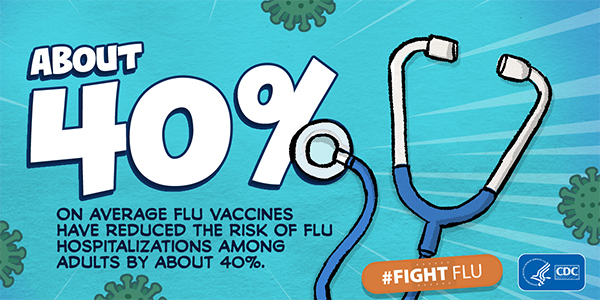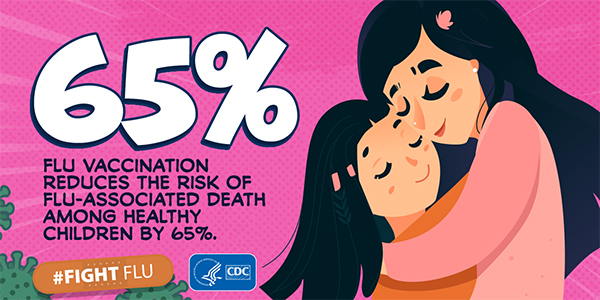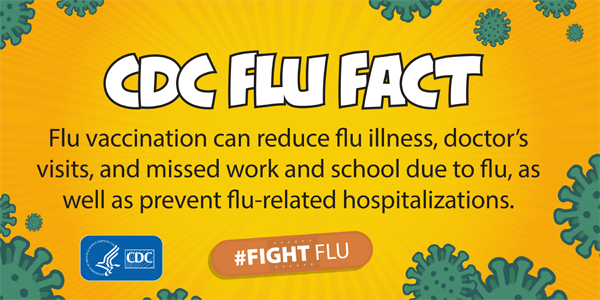The Flu Shot – 2019 Complete Guide

Your best chance at reducing your risk for getting the flu is by getting the flu vaccine.
I know what a lot of you are saying – you’ve heard that it doesn’t work. But let’s look at some facts about the flu and the flu shot. And discuss the benefits of getting an annual flu vaccination. Hopefully, this guide will answer all of your questions about the flu shot.
Personally, I have suffered from the flu on multiple occasions, and as anyone who has suffered through the flu, knows it is no fun. I’ll never forget the time over 20 years ago when I “moonlighted” in the ambulatory walk-in clinic at the hospital for extra money – and it happened to be during flu season. I treated several patients for high fevers and a few days later found myself couch-bound with the same high fever. In fact, I was tied to my couch, utterly miserable I might add with high fevers, painful cough, and generalized body aches, for 3 weeks! I was in my 20s but felt like I was 90. After that, I vowed never to make the mistake again of not getting my flu shot.
Flu and Flu Shot Interesting Facts
- On average 8% of the U.S. population gets sick from the flu each season
(this tends to fluctuate between 3% and 11%) - Children are most likely to get sick from the flu
- People over 65 are least likely to get sick from influenza
- People with the flu are most contagious the first 3-4 days after their illness begins
- Recent studies show flu vaccination reduces the risk of flu illness by between 40% and 60% among the overall population during seasons when most circulating flu viruses are well-matched to the flu vaccine
- On average flu vaccines have reduced the risk of flu hospitalizations among adults by about 40%
- Flu vaccinations have been shown to have many benefits including reducing the risk of flu illnesses, hospitalizations, and even the risk of flu-related death in children

The flu can be a very serious illness, especially in young children, adults ages 65 and over, those with underlying health conditions, and pregnant women. According to the CDC, flu shots are recommended for everyone ages 6 months and older and is considered the best way to protect yourself and your family from the flu.
Why Get a Flu Shot?
There are a lot of benefits of getting vaccinated each year for the flu. The flu shot helps protect your immune system as it stimulates the antibodies in your system which will at least partially fight the flu virus.
The flu vaccine is actually 51% effective in children. And flu vaccines have been shown to reduce children’s risk of flu-related pediatric intensive care unit by 74%. Getting children vaccination is extremely important since they are often in high-risk places like their school where the flu can spread like wildfire. Getting your child vaccinated not only helps your kid but also helps protect other children. The Journal of Pediatrics conducted a study that looked at children flu cases from 2010-2016 and found that 675 children died from the flu and 2/3 of those children did not receive the flu shot.

Getting a flu vaccination
- reduces flu illness
- reduces doctor’s visits
- reduces missed work and school
- prevents flu-related hospitalizations
- keep you from getting sick with the flu
- can make your illness milder if you do get sick
- can help protect pregnant women and their babies for several months after birth from the flu
Flu vaccinations are extremely important for people with chronic health conditions like diabetes and heart and lung disease.
Getting vaccinated yourself may also protect people around you, including those who are more vulnerable to serious flu illness, like babies and young children, older people, and people with certain chronic health conditions.

But I heard the flu shot will give me the flu
The overwhelming majority of patients that don’t get a flu shot to say: “I don’t want to get the flu from the shot itself”. This really doesn’t make sense, because the flu vaccine contains a purified protein from the virus, which has been weakened or killed. When it comes into contact with your immune system, it will then begin to make antibodies to patrol the bloodstream for a future real influenza encounter. The antibodies typically take about 2 weeks to reach protective levels and should remain protective for several months.
When is the Best Time to Get a Flu Shot?
The peak flu season seems to occur in the early winter, typically peaking in December, January, and February, so to play it safe it makes sense to get vaccinated in October and no later than November.
The flu shots take at least 2 weeks for the body’s immune system to develop antibodies to be effective in neutralizing against the infection which is why it is recommended to get the flu shot early. In some cases, it can take up to 6 weeks to reach optimal protective levels. And your flu shot should be effective and last through the high peak months.
Why do I Need to Get Vaccinated Yearly?
Because flu viruses evolve so quickly, last year’s vaccine may not protect you from this year’s viruses. New flu vaccines are released every year to keep up with rapidly adapting flu viruses.
When you get vaccinated, your immune system produces antibodies to protect you from the viruses included in the vaccine. But antibody levels may decline over time — another reason to get a flu shot every year.
Who Should Get a Flu Vaccine?
Anyone 6 months of age or older should get influenza (flu) vaccine every season. There are only rare exceptions to this recommendation.
Flu vaccinations are extremely important for anyone who is at high risk for developing flu complications. This includes:
- adults 65 years and older
- young children
- pregnant women
- children with neurologic conditions
- individuals who have
- diabetes
- HIV/AIDS
- asthma
- cancer
- heart disease and stroke
For a full list of age and health factors that confer increased risk check out the CDCs people at high risk of developing flu-related complications.
What Type of Flu Shots are Available?
Let’s take a look at the different types of flu shots that are available and what I regularly recommend to my patients.
- THE “REGULAR” FLU SHOT is usually the standard trivalent shot to protect against the 3 strains of influenza. It has a long history of safety and efficacy and can be used for patients ages 6 months and up. Here at Mitchell Medical Group, we offer the preservative-free version of this flu shot, because many patients today are wary of preservatives used in vaccines.
- THE QUADRIVALENT SHOT which covers the 4th strain of the virus. There are several brands of this type available and they are approved for different age groups. These are administered either via a needle or with a jet injector (for people 18-64 only)
- FluMist NASAL SPRAY is a great option for children. No needle, no shot — who doesn’t like that option? However, it is not for every child. Those with asthma or weakened immune systems shouldn’t receive the vaccine because it is a live virus vaccine. And pregnant women should also avoid this spray, as it can harm the fetus.
- FLUZONE HIGH DOSE For quicker response and protection against the flu, this vaccine may be a good choice for older patients.
- FLUZONE INTRADERMAL VACCINE A new type of vaccine is given less deep in the skin than the usual flu shot (but even so, I personally think this shot hurts more).
- FLUBLOK An egg-citing new option is available for the first time and is made without eggs, which makes this a great alternative for patients who have skipped the flu shot in the past because it was made from chick embryo fibroblasts. At this time it is licensed only for adults 18 to 49.
Important Facts about Flu Vaccines: They are not All the Same
There is an assortment of Flu shots available, but they are not all the same. I provide in my practice and highly recommend Fluzone for several reasons:
- It covers and protects against all the major strains of the Influenza virus.
- It is preservative-free, so it does not contain mercury or thimerosal; there is no proof these preservatives are dangerous to children, but if there is another option without them it seems to make sense.
- It’s made in the U.S.A- I don’t know about you, but I much prefer when medical treatments are actually made in the United States; I know they are rigorously tested and the quality of the products are reviewed; there are other flu vaccinations that are made in foreign countries ranging from Korea to Russia.
Debunking 4 Common Myths About Flu Shots
- The flu is just a bad cold
Wrong! The flu kills up to 49,000 people a year! 200,000 are hospitalized, according to the CDC. If you have a high fever and generalized body aches get tested immediately for the Influenza virus by your doctor – they can do an instant nasal smear and decide if you need antiviral medication. - The flu shot causes the flu
Wrong again! The injectable flu shot is treated so it’s not live and can’t transmit the flu to you. The nasal mist has a weakened live virus given to teenagers and adults under 55 without certain contraindications – on occasion, this can cause a runny nose. - Only sick people need a flu shot
Not true. Any person that is around a lot of other people can contract the flu and spread it to co-workers, family members, or fellow subway or bus riders. “Healthy” people tend to try and fight through infection, but in the case of the flu, you are just adding to your misery, and possibly spreading that misery to others. - Flu shots contain Mercury
Partially wrong, partially true. The single-dose flu injections that we give in our office at Ocean Allergy and asthma are thimerosal, preservative-free. The FluMist nasal spray given by many pediatricians is also without thimerosal. Only the flu injections from multi-dose vials – check with your pharmacist if you get your flu shot there – can contain thimerosal but it has not been linked to any specific disease.
How to Reduce Your Risk of Getting the Flu (Even with the Shot)
Take everyday preventative actions to help prevent getting the flu and spreading. Some great ways to reduce risk are
- avoiding close contact with sick people
- avoid touching eyes, nose, and mouth
- cover your coughs and sneezes
- wash your hands often (with soap and water)
For New Yorkers, since we use public transportation A LOT, try to refrain from touching stair railings, subway car poles and other parts of public transportation as much as possible – I know this can be difficult. I also recommend carrying antibacterial hand sanitizer with you at all times and use after touching any part of public transportation.
Severe and Rare (Anaphylactic) Reaction to the Flu Shot
I recently saw a woman who had an anaphylactic reaction after receiving the flu shot for the first time. It is exceptionally rare to have anaphylaxis (the most severe allergic reaction) after a flu shot. This woman’s case will bring out an important point that may save others.
This patient didn’t have a history of egg allergy, which is the focus of most doctor’s questions before getting the flu shot. In her case, there was no history of egg allergy, and in fact, she ate eggs that same morning with no reaction.
She could have been allergic to the vaccine itself, which is possible. Many times, patients can be allergic to the preservatives in the flu vaccine: such as thimerosal or formaldehyde.
This can be avoided by using the preservative-free, single-dose flu vaccine. The interesting piece of history in my patient with the severe allergic reaction was when she mentioned she was allergic to Band-Aids; and, she added matter-of-factly that she was latex allergic. Ahh! This was important. The patient showed me the package insert from the vaccine she was given. It was from a multi-dose vial, which means the injection had to be drawn up through a rubber stopper. It is most likely she received small particles of latex-rubber in the injection and this is what precipitated her anaphylactic reaction to the flu shot.
My recommendation for doctors is: ask and check to make sure your patient isn’t latex allergic; if they are using a single-dose vial. My advice to all patients: if you have latex-rubber allergy be sure to ask your doctor for a single-dose vial.
What to Do If You Get the Flu
Even with the flu shot, it is is possible to catch the flu shortly after you are vaccinated if you are exposed to the flu during this time period. Here are some tips on what to do if you end up getting the flu.
How Do You Know If You Have the Flu?
Typical flu symptoms are sometimes similar to a regular virus and can include: sore throat, cough, high fever, and muscle aches. If you have a high fever of over 101 degrees for more than 2 days it is very likely that you have the flu.
How to Get Diagnosed With the Flu?
If you think you have the flu see your doctor get assessed. You can also get a rapid nasal flu test to see if you have the flu.
This year is especially difficult when it comes to the flu because of the H3N2 virus which is very similar to the old Hong Kong flu that was around 20 years ago.
What to Do If You Have the Flu?
Once diagnosed with the flu use Tamiflu, an anti-viral medication which if started within 72 hours of contracting the flu can help ameliorate and decrease flu symptoms. Tamiflu is a great option for both children and adults.
Holistic treatment for the flu includes: rest, avoiding contact with other people, hydrating (especially with teas and soups with salt), eating lighter meals so your body can be focusing on healing and taking vitamins. Taking medicine like Advil and Tylenol is ok if you have a high fever but is not recommended with a low-grade fever.
Should I Take Antibiotics If I Have the Flu?
Most people think they need antibiotics when they have the flu but it’s actually bad to take them because they don’t actually fight the flu. Antibiotics are good if you get complications from the flu such as pneumonia.
CONCLUSION
Your best bet for not getting the flu – getting a flu shot.
Even a mismatch flu vaccine is better than nothing. It’s advised that even during years when the flu vaccine doesn’t exactly match the dominant flu strain for the year you are still better off getting the shot than not getting it. An annual seasonal flu vaccine is the best way to help protect against flu.
Please don’t be one of the 42% of consumers surveyed that they plan to skip the flu shot – there are some things in medicine we get right, and getting a flu shot is one of them.
Keep your immune strong by getting an annual flu shot.
About the Author – Dr. Dean Mitchell, M.D.
Dr. Dean Mitchell M.D. is a Board-Certified and Immunologist based out of NYC. He graduated from the Sackler School of Medicine and completed training at the Robert Cooke Allergy Institute in New York City. He is also a Professor of Clinical Immunology at Touro College of Osteopathic Medicine, a fellow of the American Academy of Allergy, Asthma and Immunology, and the author of Allergy and Asthma Solution: The Ultimate Program for Reversing Your Symptoms One Drop at a Time. Dr. Dean Mitchell, M.D. has also been featured in The New York Times, The Huffington Post, Fitness Magazine, Dr. Oz and News NY 1. Dr. Mitchell also hosts the podcast The Smartest Doctor in the Room – a combination of a lively, personal and in-depth interview with top healthcare specialists.


